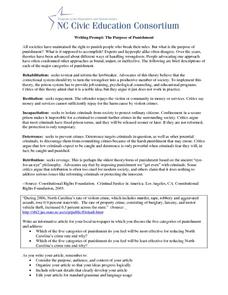Judicial Learning Center
Types of Court Cases
How can one court acquit someone of a crime, while another convicts the person of the same one? It's all because of the differences between civil and criminal trials. An informative resource provides scholars in the field of criminology...
Judicial Learning Center
Civil Rights and Equal Protection
Almost every American is familiar with the Supreme Court case of Brown vs. Board of Education. Far fewer understand the constitutional reasoning or the wide-ranging consequences of the ruling in the field of criminology. The interesting...
Judicial Learning Center
The Appeal Process
Why doesn't the Supreme Court hear testimony from witnesses? How do they complete an entire proceeding in less than two hours? A helpful lesson guides scholars of criminology through these and other questions by explaining how appeals...
Judicial Learning Center
Your Day in Court
Whether out of choice or necessity, people want to know what will happen on a typical day in court. A helpful lesson walks scholars in the field of criminology through the trial process from opening statements to the final verdict.
Judicial Learning Center
The Judge and the Jury
Unless you are a lawyer, you might not understand just how unrealistic Law and Order and other legal dramas actually are. Here's a great resource to help scholars of criminology gain a more realistic perspective. The lesson outlines the...
Judicial Learning Center
Why Study Landmark Cases?
Why study landmark Supreme court cases? A helpful lesson offers a brief but valuable argument for the importance of these cases in the field of criminology. It introduces scholars to some key terms necessary for studying court cases and...
Curated OER
4-H Citizenship Activity Page - Beginning Level
This is a 4-H citizenship activity that asks learners to examine county government, city councils, the three branches of the United States government, and complete a community service project. It also includes a word search,...
Judicial Learning Center
State Courts vs. Federal Courts
Popular culture often portrays the Feds as the most fearsome of law enforcement agencies. Yet, someone charged with a crime is considerably more likely to end up in a state court. The lesson, one of six covering the Organization of the...
Nebraska Department of Education
Social Class and Fitting In
Social classes may be explicitly defined as in a caste system or based more informally on such ideas as wealth or education. After reading and discussing an article about one woman's experience with trying to fit into a system different...
Facing History and Ourselves
Laws and the National Community
When it comes to the law, is justice always served? Teach scholars about how law sometimes enables prejudice of entire groups of people with a unit on World War II that includes a warm-up activity, analysis of primary sources,...
National Woman's History Museum
African American Activists
Ida B. Wells, Rosa Parks, and Fannie Lour Hammer are three African American activists who stood up for change. Though living in different time periods, all three women sought justice and equality. Class members examine primary source...
Curated OER
The Youth Criminal Justice Act
Learners review the Youth Criminal Justice Act and examine the consequences for young people who commit crimes. They investigate the rehabilitation and reintegration processes associated with the act.
Curated OER
'And Maybe I Can Change That Too'
Students consider their own prejudices and stereotypes. In this social justice lesson, students monitor their own reactions to people who are different from themselves. Students watch a video featuring Toni Morrison that presents a...
Curated OER
Freedom Fighters
Students discover the accomplishments of Nelson Mandela and Martin Luther King, Jr. For this social justice lesson, students watch "Freedom Fighters," and then read speeches or writings made by each of the men. Students write compare and...
Curated OER
Executive Decisions
Students explore the role of judges in Britain. In this current events lesson, students visit selected websites to discover the responsibilities of judges and the justice reform in Britain.
BBC
Crime: Justice
Are the juvenile courts fair? Learners read a bit from the classic Oliver Twist to consider how young people are treated and represented when they've been accused of a crime. They read a case study from their books, discuss children's...
Curated OER
Social Studies Lesson: Apartheid
Students examine the Apartheid system of South Africa through a role-play activity. The role-play activity ends with a class discussion on how the events affected each individual. A class discussion continues after reading an article...
Curated OER
Supreme Court Confirmation Process
Learners examine the Supreme Court and the confirmation process. They simulate a confirmation hearing with students role-playing as nominees and others as members of the Judiciary Committee. Learners compose short essays outlining the...
Curated OER
Civics: Missouri's Non-Partisan Court Plan
Students examine the ways that the Missouri Non-Partisan Court Plan helps the court maintain a system of separation of powers and checks and balances. After discussing the principle of judicial impartiality, they complete a chart...
Judicial Learning Center
Your 4th Amendment Rights
Americans love to learn about their rights, especially those that protect them from the government's power to invade their privacy. Young people are especially engaged by this topic. An informative lesson explores four Supreme Court...
DocsTeach
Court Packing vs. Reorganizing: The Supreme Court in the New Deal
Travel back in time to understand the effects of FDR's New Deal on the Supreme Court. Academics analyze historical documents to understand FDR's attempts to pack the Supreme Court and the opposition he faced. The activity includes a...
Carolina K-12
Writing Prompt: The Purpose of Punishment
When punishment is given in a society when a member breaks its rules, what is it meant to accomplish? After summarizing the significant categories of punishment (rehabilitation, restitution, incapacitation, deterrence, and retribution),...
Judicial Branch of California
The Power of the Press: The First Amendment
Was what happened in 1886 at the Haymarket riot a crime or a case of xenophobia? Using political cartoons from the time, young historians consider the role the media played in anti-labor sentiment during the time and how that influenced...
Teaching Tolerance
Mass Incarceration as a Form of Racialized Social Control
Mass incarceration: A result of a tough stance on crime or racial discrimination, you decide. Academics explore the history and reasons behind mass incarcerations in the United States and its impact on ethnic communities. The...
Other popular searches
- Juvenile Justice System
- The Criminal Justice System
- Adult Justice System
- British Justice System
- Us Justice System
- Canadian Justice System
- Justice System Ell
- The Justice System
- Criminal Justice System,
- The Juvenile Justice System
- Us Criminal Justice System
- Justice Systems World

























